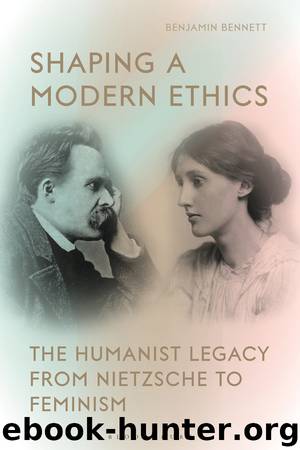Shaping a Modern Ethics by Benjamin Bennett;

Author:Benjamin Bennett;
Language: eng
Format: epub
Publisher: Bloomsbury UK
Freud’s Avoidance of Closure
In order to fill out our picture of psychoanalysis as an intellectual discipline, let us begin with three instances of Freud’s discomfort with the possibility or approach of theoretical closure. In Totem and Taboo, first of all, Freud is very definite about his conclusion “that the beginnings of religion, morals, society and art converge in the Oedipus complex,” a conclusion which “is in complete agreement with the psychoanalytic finding that the same complex constitutes the nucleus of all neuroses, so far as our present knowledge goes” (GW 9:188; SE 13:156–7). But he is equally definite about not being blinded to “the uncertainties of my premises or the difficulties involved in my conclusions” (GW 9:189; SE 13:157). Specifically,
I have taken as the basis of my whole position the existence of a collective mind, in which mental processes occur just as they do in the mind of an individual. In particular, I have supposed that the sense of guilt for an action has persisted for many thousands of years and has remained operative in generations which can have had no knowledge of that action. (SE 13:157–8)
And he never attempts to justify this supposition, except by the vague suggestion that “everyone possesses in his unconscious mental activity an apparatus which enables him to interpret other people’s reactions” (GW 9:191; SE 13:159) and hence perhaps to carry on a “heritage of emotion” from older generations—as if that “heritage” could retain anything like its original strength in being transmitted thus. That is, he does not open the theoretical issue that his own theory insists upon at this point, the question of Lamarckian or soft inheritance, the inheritance of acquired characteristics including the residue of personal experiences. Or rather, he resists the idea that his own theory is sufficiently closed to raise this question.
His procedure later, in Beyond the Pleasure Principle, at first seems diametrically the opposite, but in the end has exactly the same effect. Here he infers from the observed fact of repetition–compulsion the existence of a class of instincts that he eventually calls “death” instincts, instincts whose violation of the pleasure and reality principles is explained by their location, as instincts, on an earlier and deeper level of the psychic development. But this inference has the effect of apparently requiring a dualistic theory of instincts, because it does not seem possible to subsume the sexual instincts under the theorem “that an instinct is an urge inherent in organic life to restore an earlier state of things” (GW 13:38; SE 18:36). “We should consequently feel relieved [!];,” says Freud, “if the whole structure of our argument turned out to be mistaken” (GW 13:46; SE 18:44).
And in order to seek this supposed “relief,” he now permits himself the impermissible; he treats his theory as if it were closed and builds it upon itself into the domain of general biology. Sexual instincts, he asserts, are present in all life down to the cellular level. If the same can be shown not to be
Download
This site does not store any files on its server. We only index and link to content provided by other sites. Please contact the content providers to delete copyright contents if any and email us, we'll remove relevant links or contents immediately.
| Anthropology | Archaeology |
| Philosophy | Politics & Government |
| Social Sciences | Sociology |
| Women's Studies |
Inward by Yung Pueblo(877)
The Good Book by A. C. Grayling(859)
A Meaning to Life by Michael Ruse(595)
Rings of Saturn by W. G. Sebald(582)
Letting Go: The Pathway of Surrender by David R. Hawkins(531)
The Most Human Human: What Talking With Computers Teaches Us About What It Means to Be Alive by Brian Christian(503)
The Astrology of Love & Sex by Annabel Gat(497)
The Jesus Delusion by Heinz-Werner Kubitza(484)
Corporate Psychopathy by Katarina Fritzon & Nathan Brooks & Simon Croom(478)
A Wonderful Life by Frank Martela PhD(474)
The Feeling of Life Itself by Christof Koch;(461)
The Most Human Human: What Talking with Computers Teaches Us About What It Means to Be Alive by Christian Brian(389)
Love Unveiled by A. H. Almaas(357)
Choiceless Awareness by J. Krishnamurti(348)
Design, Mediation, and the Posthuman by Dennis M. Weiss(333)
An End to Upside Down Living by Gober Mark(329)
A Burst of Conscious Light by Andrew Silverman(327)
Lin Yutang - the Importance of Living by Lin Yutang(327)
The Ecological Thought by Timothy Morton(325)
